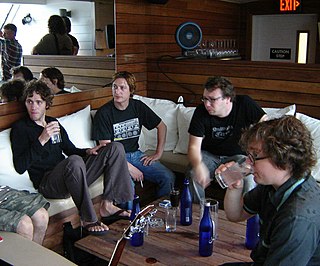
Gomez are an English indie rock band from Southport, Merseyside, comprising Ian Ball, Paul "Blackie" Blackburn (bass), Tom Gray, Ben Ottewell and Olly Peacock. The band has three singers and four songwriters, employing traditional and electronic instruments. Their music covers the genres of blues, indie, alternative, rock, folk, psychedelic and experimental.

The Remote Part is the third studio album by Scottish rock band Idlewild, released on 15 July 2002 by Parlophone. As they were becoming increasingly aware of their label's interest in them and their demos, the band's musical direction was being steered by guitarist Rod Jones. For the first half of 2001, the band recorded songs with producers Stephen Street and Lenny Kaye. Due to the uneven nature of the songs done between tours, they spent some time reworking 20 tracks in the Scottish Highlands. They recorded at Rockfield Studios in Wales, RAK Studios in London, and Sawmills Studios in Cornwall with producer Dave Eringa. Described as an alternative rock and indie rock record, it lacked the punk rock elements of their previous work.

Hope Is Important is the debut studio album by Scottish rock band Idlewild, released 26 October 1998 through Food Records. After finalizing their line-up and releasing two singles in 1997, the band released their mini album Captain in early 1998. Afterwards, the band signed with Food Records, and recorded their debut album between February and June 1998 at Chapel Studios in Lincolnshire and Westland Studios in Dublin with producer Paul Tipler. Described as a grunge and punk rock album, Hope Is Important was compared to Bleach (1989) by Nirvana.

Liquid Skin is the second album by English rock group Gomez, released on 13 September 1999 by Hut Records. Following the release of their debut studio album Bring It On (1998), the band began recording their follow-up between August 1998 and June 1999 at Parr Street Studios in Liverpool, and Abbey Road Studios in London. Gomez were allowed to self-produce the sessions after their label heard the strength of their demos. Described as a blues rock album, Liquid Skin was compared to the work of Beck, the Grateful Dead, and Pearl Jam.

Up at the Lake is the eighth album by the British alternative rock band The Charlatans, released on 17 May 2004 through Universal and Island Records Group. As promotion wrapped up for their seventh album, Wonderland (2001), Universal wanted them to follow it up with another one quickly. However, frontman Tim Burgess began working on his debut solo album in late 2002. At the end of the year, the band reconvened to write songs; by March 2003, they relocated to their own studio, Big Mushroom, in Cheshire, Greater Manchester, with them and James Spencer serving as producers. Recording halted in May 2003 to allow for Burgess to finish his album, I Believe (2003); sessions would resume by the end of the year and finish in February 2004. Up at the Lake is a pop rock album that pursues the country rock direction that they had first explored on their sixth album, Tellin' Stories (1997).
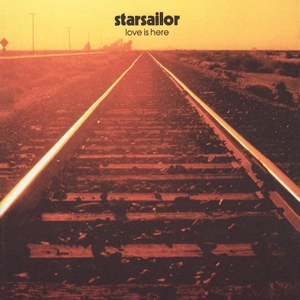
Love Is Here is the debut studio album by rock band Starsailor, released on 8 October 2001 by Chrysalis Records. After finalising their line-up, a positive review from NME started a bidding war between record labels that eventually saw the band sign to EMI. Following the making of some demos, "Fever" and "Good Souls" were released as singles on 4 February 2001 and 23 April 2001, respectively. The band recorded their debut album at Rockfield Studios with producer Steve Osborne over the course of six weeks. Love Is Here features acoustic guitars accompanied by gentle piano chords, earning it comparisons to the albums Parachutes (2000) by Coldplay, and The Invisible Band (2001) by Travis.
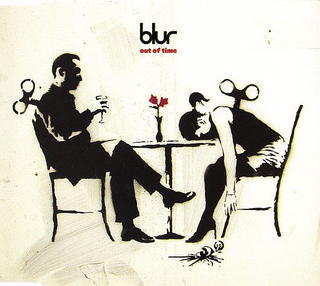
"Out of Time" is a song by British band Blur from their seventh studio album, Think Tank (2003). The song was written and produced by band members Damon Albarn, Alex James and Dave Rowntree, with Ben Hillier also serving as a producer. After being premiered via BBC Radio 1 on 3 March, it was released as the album's lead single on 14 April 2003, by Parlophone. The song became the band's first release without guitarist Graham Coxon. It is a pop ballad featuring acoustic guitars and bass, as well as a Moroccan orchestra. Lyrically, it deals with a civilisation that has lost touch, with Coxon's departure being referenced in the lyrics.

Anthology is the second studio album by American rock band Alien Ant Farm. It was released on March 6, 2001, through New Noize and DreamWorks Records. Following the self-release of the band's debut studio album, Greatest Hits (1999), they played several showcases in Los Angeles, California. At the end of 2000, Alien Ant Farm started recording their next album with producer Jay Baumgardner at NRG Recording Studios in North Hollywood, California. An alternative metal and nu metal release, critics compared the album to the works of Incubus and A Perfect Circle.
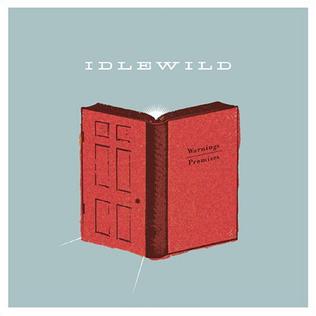
Warnings/Promises is the fourth studio album by Scottish rock band Idlewild, released on 7 March 2005 by Parlophone. Following the release of their third studio album The Remote Part (2002), Gavin Fox replaced bassist Bob Fairfoull, and touring guitarist Allan Stewart became a permanent member. They spent the majority of 2003 writing material, before traveling to Malmö, Sweden to record at Tambourine Studios with producer Dave Eringa. After finishing five tracks, they went to Los Angeles to work at Sunset Sound Recorders with producer Tony Hoffer. Due to the laidback nature of the sessions, the band had to re-record everything; recording concluded in October 2004. Described as a college rock and folk rock album, Warnings/Promises emphasized more acoustic instrumentation than its predecessor.

"Positivity" is the first single from the album A New Morning by Suede, released on 16 September 2002 through Epic Records. Although it received mixed reviews from critics and fans, the song became one of the band's final hit singles, reaching number one in Denmark, number 12 in Spain, number 15 in Finland and Norway, and number 16 in their native United Kingdom.

The Good Will Out is the debut studio album by British rock band Embrace, released on 8 June 1998, by Hut, Mobetta and Virgin Records. The band formed in 1993; by 1996, they consisted of vocalist Danny McNamara, his brother, guitarist Richard McNamara, drummer Mike Heaton and bassist Steve Firth, and Tony Perrin had become their manager. A single, "All You Good Good People", was released through Fierce Panda in February 1997, attracting music media and record label interest, resulting in the band signing to Hut. Produced by the band, Dave Creffield and Martin "Youth" Glover, sessions for their debut were held at the Hook End, Whitfield Street and Metropolis studios. Other production staff included Jonny Dollar, who almost produced the album, Steve Osborne, who did additional production on one song, and Hugo Nicolson, who handled recording on another.

Drawn from Memory is the second album by English rock band Embrace, released on 27 March 2000 by Mobetta, Hut, and Virgin Records. Following the release of their debut studio album The Good Will Out (1998), touring keyboardist Mickey Dale became an official member. Frontman Danny McNamara began suffering from writer's block, leaving guitarist Richard McNamara to handle the writing. Sessions were done at Batsford Park Manor in Gloucestershire, Olympic Studios in London, and Soundworks Studios in Leeds. Tristin Norwell and the band producer the entire album, bar "You're Not Alone", which was produced by Hugo Nicolson. Songs on the album centred around the arrangements and the interplay between instruments, instead of being melody-driven.

If You've Never Been is the third studio album by English rock band Embrace. It was released on 3 September 2001 through Hut, Mobetta, and Virgin Records. Within a month of releasing their second studio album Drawn from Memory (2000), the band had started writing its follow-up. Recording took place at Soundworks in Leeds, with Ken Nelson and the band co-producing the sessions, which lasted from February to May 2001. If You've Never Been is a soft rock album that uses more strings and horns compared to its predecessor.

Out of Nothing is the fourth studio album by English rock band Embrace. It was released on 13 September 2004 through the label Independiente. Following the release of their third studio album If You've Never Been (2001), the band were dropped by Hut Records; around this time, the general public had lost interest in them. After signing to Independiente, they took time working on new material, until early 2004, when they recorded their next album at Olympic Studios in London with producer Martin "Youth" Glover. Out of Nothing is an indie rock album that drew comparison to the works of Coldplay and Keane.

"Crazy Beat" is a song by English band Blur from their seventh album, Think Tank (2003). The song was written and produced by band members Damon Albarn, Alex James and Dave Rowntree in Morocco, with Norman Cook also serving as a producer. It was first serviced to alternative radio stations in the United States on 17 March 2003, by Virgin Records, while being commercially released in the United Kingdom on 7 July 2003, by Parlophone, including the songs "The Outsider" and "Don't Be" as B-sides. A three-chord song, "Crazy Beat" is a dance-pop and electropop track which draws influences of big beat and nu metal into its composition. Lyrically, it praises the effects of music and clubs on crowds.
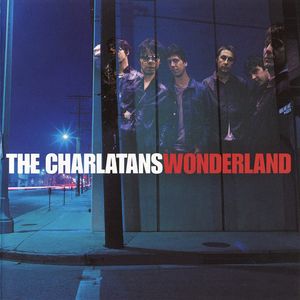
Wonderland is the seventh album by British rock band the Charlatans, released on 10 September 2001 through Universal. Following promotional efforts for their sixth studio album, Us and Us Only, vocalist Tim Burgess and guitarist Mark Collins wrote new material at the former's house in Los Angeles, California. Cocaine would have an impact on the writing and, later on, recording; sessions were held at producer Danny Saber's house studio, Krevorkian's Lab, also in Los Angeles. The band worked with him for seven weeks in October 2000, only completing five tracks, and later went to their own studio, Big Mushroom in Cheshire, Greater Manchester, in early 2001. Wonderland is a funk-soul and electronica record, evoking the work of John Mellencamp, Oasis, and Primal Scream. Burgess remarked that Los Angeles itself became a member of the band; critics referred to it as a drug-enhanced party album. He employed a falsetto in the vein of Curtis Mayfield and Kurt Wagner.
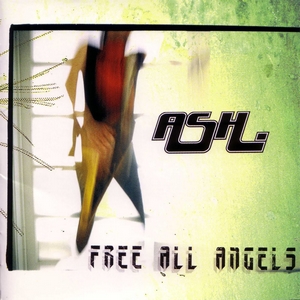
Free All Angels is the third studio album to be recorded by Northern Irish rock band Ash. It was released on 23 April 2001 through Infectious Records and Home Grown. Due to the mixed reaction to the band's second studio album Nu-Clear Sounds (1998), frontman Tim Wheeler suffered from depression. He went to his parents' house in Northern Ireland to write material for the band's next album. Free All Angels was co-produced by the band and Owen Morris, and recording sessions were held at El Cortijo in Puerto Banús, Spain, then moved to The Wool Hall in Beckington and RAK Studios in London. The album was described as pop punk, power pop and punk rock, and drew comparisons to the works of China Drum, Compulsion, Hüsker Dü, and the Replacements.

Pleased to Meet You is the ninth studio album by English rock band James. Less than a year after the release of Millionaires (1999), the band were playing new material live. Recording was split between Ridge Farm, Whitfield St., House in the Woods studios; producer credit was split between Brian Eno, guitarist/violinist Saul Davies, KK and the band. "Getting Away with It " was released as a single in late June, followed a week later by Pleased to Meet You on 2 July through Mercury Records.

Detroit Swing 66/Ping One Down is a seven-track EP by British rock band Gomez, released in 2002 on Hut/Virgin Records in Australia. Both Detroit Swing 66 and Ping One Down had been featured on the album In Our Gun. Detroit Swing 66 was played to radio in Australia only. However, Ping One Down had a video made and was released as another double A side single in the UK, together with Sound of Sounds. Consequently, Sound of Sounds never aired in Australia. The EP’s B-sides are mostly from the UK Gomez single Shot Shot, apart from Click Click, which had been featured on the UK Ping One Down/Sound of Sounds single. The five extra tracks were later that year put onto a bonus disc to be repackaged with In Our Gun.

Handcream for a Generation is the fourth studio album to be recorded by the British rock band Cornershop. It was released on 1 April 2002 by Wiiija. Following the release of their third studio album When I Was Born for the 7th Time (1997), the band abstained from touring for the majority of 1998. During their hiatus, frontman Tjinder Singh and guitarist Ben Ayres worked as disc jockeys (DJs), formed the side project Clinton and released an album under that moniker while Singh was suffering from fatigue. Between mid-2000 and June 2001, Cornershop recorded their next album at West Orange Studios in Preston, Lancashire, and Eastcote Studios in Ladbroke Grove, London. Singh produced the album and Rob Swift co-produced two of the songs.




















